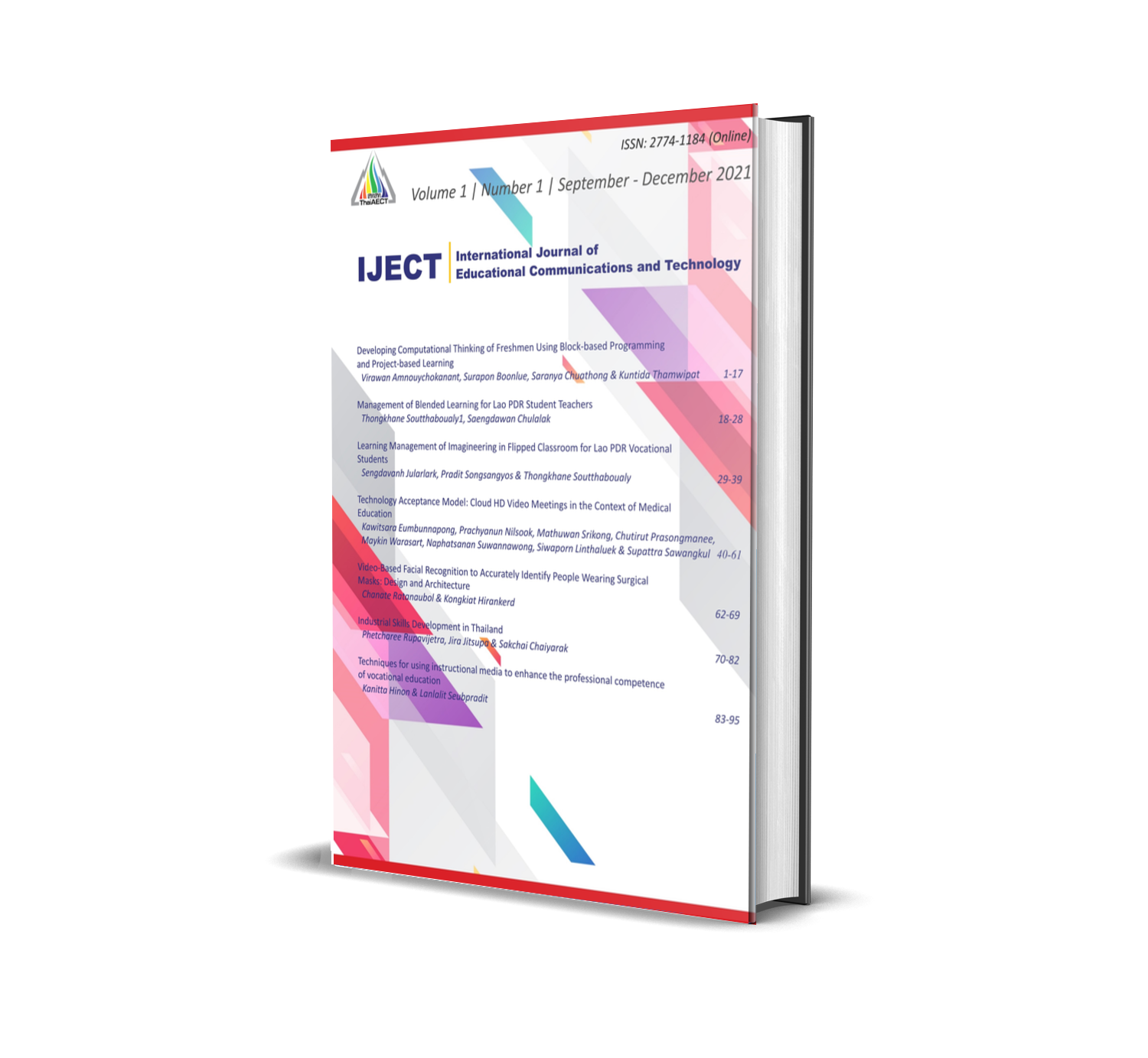Industrial Skills Development in Thailand
Keywords:
Industrial Skills, Skills Development, ThailandAbstract
Research on titled ‘Industrial Skills Development in Thailand’ aimed to examine historic background of Thai labor situation; skills formation and development in selected industries; relationship between differences of cultural management styles and skills development in workplace; the potential of skills development in Thailand. The tools used in this research were interview with employers, managers, employees in selected workplaces, and trainers and staff in the Chiang Mai and Lamphun Skills Development Centers and observation work process in 7 kinds selected factories which consisted of 10 factories – 2 car industries, 2 electronics, 1 engine part, 1 pottery, 1 textile, 1 jewelry and 2 food processing. The results of research indicated historic background of Thai labor situation that for primarily Thai labor had low education because of poverty and negative attitude toward education and training. Employment as wage labor of Thais was the consequent of economical changes and expanding of industrialization from both Thai and foreigner investment. 2. Thai labor form skills in workplace more than in educational institutions. For factories involved with technology, Thai labor had technical skills to work by operating task under supervision. Skills of labor depended on year or working and self-development. For jewelry and pottery, Thai labor indicated high skills on producing these crafts. The products could lead to added-up value and high price. 3. Cultural management styles affect how labor work and support to form and develop skills in workplace if employers paid much attention on employees. With teamwork like in Japanese styles, conducting training often like OJT and training often, good relation in firm, these practices support skills development. Finally, the potential of skills development in workplace in Thailand tended be more positive because mostly Thais in workplace contemporary had positive attitude to training, influence of educational reform and the Skill Development Act.
References
Agnieszka, W., & Peraset, C. (2015). When Japanese and Thai Cultures Meet in Thailand, What Does Literature Tell Us? Japanese Studies Journal, 32(1), 115–127. https://so02.tcithaijo.org/index.php/japanese/article/view/51637/42793
Chalamwong, Y. (2011). Management of Cross-border Low-Skilled Workers in Thailand : An Update. TDRI Quarterly Review, 26(4), 4–5. Chatrakul Na Ayudhya, S. (2010). The Thai Labour Movement: Strength Through Unity Challenges and Recommendations. Policy Analysis Thailand. https://library.fes.de/pdffiles/bueros/thailand/07563.pdf
Cronholm, S. (2021). Lifelong Learning: Principles for Designing University Education. Journal of Information Technology Education: Research, 20, 035–060. https://doi.org/10.28945/4686
DeAngelis, L., Penney, S. H., & Scully, M. A. (2014). Teamwork: Crucible for Learning about Collaborative Leadership. Athens Journal of Education, 1(4), 283–294. https://doi.org/10.30958/aje.1-4-1
Dhitiphong, M., Nuttida, K., Piyaporn, T., Kanyarat, A., & Piyathida, R. (2020). The Bowring Treaty with the Economic Impact of Thailand Buddhist Era 2398. The 12th NPRU National Academic Conference, 12, 2655–2661.
Hess, C., Mayayeva, Y., Reichlin, L., & Thakur, M. (2016). Supportive Services in Job Training and Education: A Research Review. Institute for Women’s Policy Research.
Hussey, D. (1993). International Review of Strategic Management 1993, Volume 4 - International Review of Strategic Management. Wiley.
International Labour Organization. (2020). Global Wage Report 2020–21: Wages and minimum wages in the time of COVID-19. In ILO Flagship Report. International Labour Office –Geneva.
Kim, K. S., & Vorasopontaviporn, P. (1989). International trade, Employment, and income: The case of Thailand. The Developing Economies, 27(1), 60–74. https://doi.org/https://doi.org/10.1111/j.1746-1049.1989.tb00147.x
McCauley, K. D. (2019). The Arena: An Activity to Foster Teamwork, Communication, and Cooperation in and Across Teams. Management Teaching Review, 6(3), 199–209. https://doi.org/10.1177/2379298119883356
Meyer, T. G. (2020). Difference as privilege: identity, citizenship and the recontextualisation of human rights in Japan’s social studies curriculum. Critical Studies in Education, 61(1), 17– 36. https://doi.org/10.1080/17508487.2017.1352007
Ministry of Labour. (2021). Skill Development Promotion Act, B.E. 2002. https://www.mol.go.th/employer/act_skill_development
Mutwarasibo, F. (2013). University Students’ Conceptions and Practice of Collaborative Work on Writing. International Journal of Higher Education, 2(2), 13–21. https://doi.org/10.5430/ijhe.v2n2p13
Nantawiwat, N. (2019). Labor Potential and Thai Economic Development. Department of Skill Development. https://www.dsd.go.th/DSD/Km
National Museums Scotland. (2021). Thai Ceramics. https://www.nms.ac.uk/explore-ourcollections/stories/world-cultures/thai-ceramics/
Ngo, C. (1992). Foreign Investment Promotion: Thailand as a Model for Economic Development in Vietnam. Hastings Int’l & Comp. L. Rev., 16(1), 67–98.
Nilsook, P., Chatwattana, P., & Seechaliao, T. (2021). The Project-based Learning Management Process for Vocational and Technical Education. Higher Education Studies, 11(2), 20. https://doi.org/10.5539/hes.v11n2p20
OECD. (2021). OECD Investment Policy Reviews of Thailand. HIGHLIGHTS. https://books.google.com/books?id=3PNLAgAAQBAJ&pgis=1
Pham, T. (2021). Reconceptualising employability of returnees: what really matters and strategic navigating approaches. Higher Education, 81(6), 1329–1345. https://doi.org/10.1007/s10734-020-00614-2
Phananiramai, M. (1997). Population Changes and Economic Development in Thailand: Their Implications on Women’s Status. TDRI Quarterly Review, 12(3), 15–26. https://www.thaiscience.info/journals/Article/TQR/10475137.pdf
Poliakova, I. V., Lukashenko, D. V., Andryushchenko, I. S., Alekseeva, P. M., & Sergeeva, M. G. (2021). Training of Future Education Managers For Professional Activities. Propósitos y Representaciones, 9(SPE2). https://doi.org/10.20511/pyr2021.v9nspe2.1106
Rujira, T., Nilsook, P., & Wannapiroon, P. (2020). Synthesis of vocational education college transformation process toward high-performance digital organization. International Journal of Information and Education Technology, 10(11), 832–837. https://doi.org/10.18178/ijiet.2020.10.11.1466
Rupavijetra, P. (2010). Industrial Skills Development in Thailand. https://www2.gsid.nagoyau.ac.jp/blog/anda/files/2010/06/23_phetcharee-rupavijetra.pdf
Siam Commercial Bank. (2015). Insight Bridging Thailand’s Labor Gap. https://www.scbeic.com/en/detail/file/product/1251/e22mxi3krw/ENG_labor_insight_Q1_2 015.pdf
Stupak, O. (2020). Educational Technologies in Training Future Managers. Advanced Education, 7(15), 97–104. https://doi.org/10.20535/2410-8286.200229
Sultanova, L. (2016). Origin and Development of Multicultural Education in the USA. Comparative Professional Pedagogy, 6(2), 49–53. https://doi.org/10.1515/rpp-2016-0018
Wannapiroon, P., Nilsook, P., Jitsupa, J., & Chaiyarak, S. (2021). Technology acceptance of online instruction for vocational instructors in new normal education. World Journal on Educational Technology: Current Issues, 13(4), 635–650.
Yasuda, T. (2019). An exploratory study for factorial validity of cognitive styles among Japanese adult EFL learners: from educational and cultural perspectives. Asian-Pacific Journal of Second and Foreign Language Education, 4(1), 1–20. https://doi.org/10.1186/s40862-018- 0063-1
Zhu, J., Hu, Y., Zheng, T., & Li, Y. (2021). Engineering leadership in a Chinese industrial context: An exploration using the four capabilities model. Journal of Engineering Education, 110(3), 765–790. https://doi.org/https://doi.org/10.1002/jee.20404
Downloads
Published
How to Cite
Issue
Section
License
Copyright (c) 2021 International Journal of Educational Communications and Technology

This work is licensed under a Creative Commons Attribution-NonCommercial 4.0 International License.







